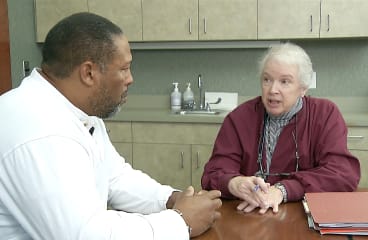Our Health Library information does not replace the advice of a doctor. Please be advised that this information is made available to assist our patients to learn more about their health. Our providers may not see and/or treat all topics found herein.
Topic Contents
Cardiac Rehabilitation: Outpatient Program
Overview

Cardiac rehabilitation (rehab) typically includes an outpatient program. This program is one part, or phase, of your cardiac rehab.
You will likely take part in a supervised exercise program.
You will receive information and tools to have a heart-healthy lifestyle, such as:
- Not smoking.
- Healthy eating.
- Staying at a healthy weight or losing weight if you need to.
- Being active.
- Managing stress.
- Taking your medicines.
- Managing other health problems.
You may also receive vocational rehab so you can return to work safely and sooner.
Supervised exercise program
Discuss any additional physical limitations or medical issues with your doctor before you start any exercise program.
The frequency and duration of rehab sessions for each week will vary depending upon the structure of your personal program. Your exercises may vary depending on your medical history, clinical status, and symptoms, and whether you had heart surgery.
You will exercise regularly in a rehab facility. This exercise includes stretching, aerobic exercise, and an introduction to strength training.
You will likely have exercise goals. These could be to:
- Have more aerobic capacity.
- Get stronger.
- Learn how to monitor your own heart rate and rate your activity level.
- Learn stretching and strength exercises.
- Return to your recreational activities.
Your progress will be monitored by several rehab staff members. While you exercise, a health professional tracks your heart rate and rhythm, blood pressure, and symptoms.
- Your heart rate will be checked to be sure it doesn't get too high. As you progress, you will learn to check your own heart rate and rhythm.
- You may have a follow-up exercise stress electrocardiogram (ECG, EKG) during this phase to see how your heart is tolerating exercise.
Stretching and flexibility
Make stretching part of your warm-up and cooldown every time you exercise. Enjoy the feeling of relaxation as you stretch. As you do each exercise in a slow and controlled manner, focus on your breathing and become more aware of your body's range of motion and positioning.
An example program:footnote 1
- How often: at least 2 or 3 days a week
- Intensity: stretching to a position of mild discomfort
- How long: 10 to 30 seconds for each stretch
- Repetition: 4 or more for each stretch
- Type: control and hold without resistance, emphasis on lower back and legs
Aerobic exercise
An outpatient program includes a carefully monitored aerobic program that involves one or more types of exercise. Choose an exercise that you enjoy, and record how hard you exercise. Use your target heart rate (THR) or rating of perceived exertion (RPE).
You will exercise within a specific heart rate range. Over time, your staff may ask you to work harder when you exercise.
Sometimes exercise may cause angina (such as chest pain or discomfort). It is important to know when you reach an exercise intensity that causes angina and to exercise below that threshold. So note your heart rate intensity at any signs of chest discomfort or pain, and tell your doctor and the staff who is supervising your exercise. Your team may suggest that you use a heart rate monitor to accurately record your heart rate and exercise below the heart rate when symptoms happen.
This aerobic exercise program includes walking, swimming, or biking. An example program:footnote 1
- How often: 3 to 5 times a week
- Intensity: Heart rate: within your target heart rate range
- How long: 20 to 60 minutes
- Progression: Increase duration gradually
Strength training
Strength training has been shown to be very effective with cardiac patients for improving muscular strength and endurance as well as help in improving coronary risk factors. It also decreases the cardiac demands of daily activities such as lifting and increases your endurance capacity for other activities.
Do not start a strength-training program without discussing it with your doctor.
When you are strength-training, be sure to follow recommendations for correct technique, breathing, and appropriate intensity.
Strength training can include the use of hand weights and machines. An example program:footnote 1
- How often
- 2 to 3 days a week
- Intensity
- No straining
- No pain
- How much
- 10 to 15 reps for each set
- 1 to 3 sets for each exercise
- Progression
- Increase resistance
Related Information
References
Citations
Credits
Current as of: July 31, 2024
Author: Ignite Healthwise, LLC Staff
Clinical Review Board
All Ignite Healthwise, LLC education is reviewed by a team that includes physicians, nurses, advanced practitioners, registered dieticians, and other healthcare professionals.
Current as of: July 31, 2024
Author: Ignite Healthwise, LLC Staff
Clinical Review Board
All Ignite Healthwise, LLC education is reviewed by a team that includes physicians, nurses, advanced practitioners, registered dieticians, and other healthcare professionals.
This information does not replace the advice of a doctor. Ignite Healthwise, LLC disclaims any warranty or liability for your use of this information. Your use of this information means that you agree to the Terms of Use and Privacy Policy. Learn how we develop our content.
To learn more about Ignite Healthwise, LLC, visit webmdignite.com.
© 2024-2025 Ignite Healthwise, LLC.




